Last Saturday (16th March, 2013) saw a day arrive that many people associated with the Camp King area had been waiting for, none more so than local history Manfred Kopp, when the Camp King archive finally moved into its permanent home at the “Kinderhaus”.
Except that the “Kinderhaus” was not always called that. On the map it may now have the address “Jean-Sauer-Weg 2”, but it was originally called “Haus am Wald” and had the address “Außerhalb 7”. In the post-war period it was called “Haus Florida”, and the U.S. army later called it simply “Haus 997”.
At 11am a group gathered around the entrance to the cellar, next to the artwork “Don’t look back”, among them Mayor Hans-Georg Brum and Deputy Principle Officer of the U.S. Consulate General in Frankfurt, Charisse Phillips.
Mrs.Phillips was herself born in Frankfurt and her father worked at Camp King. Her sister was married in the chapel and she remembers going to the officers’ brunch in the Mountain Lodge on Sunday mornings.
During the ceremony, Alderman Christof Fink highlighted the significance of the archive being in the “Kinderhaus”, allowing children in the area to find out more about what used to be here and find out more about the area’s past.
But it was left to Manfred Kopp to explain how his interest in Camp King came about, when a group of children from the local grammar school asked him to give them a tour of the area in 2005, which led him to start collecting documents about it and meeting people who had lived and worked there as far back as the 1930s. So far, he has taken 1,400 people on tours of the area.
He said that researching the history of Camp King was like doing a very addictive jigsaw puzzle. He then produced one of the commemorative plates that were given to the U.S. soldiers when they left the base to return home, which features a picture of the Mountain Lodge, and presented it to Stefan Kuhn who is one of the investors looking to redevelop it.
The archive itself is in the basement of the building, in what apparently used to be the kitchen. With its low ceiling, there is not much room and to allow the visitors to see some of the documents and photographs these had been put on display in another room next door.
Having viewed these the visitors made their way to the ground floor where Hans-Georg Brum’s predecessor as Mayor, Gerd Krämer, held a talk on the need for having places to remember. He talked in particular about the time when the American forces had left and the national government was looking to sell off the land. Not only were the plans to pull down the buildings and discussions about what to do with ornamental swastikas inside them that the Americans had left in place, but, as he put it, “after the Americans had gone, history was not an issue”.
However, in the end, most of the buildings did stay and it is now recognised that the Prisoner of War camp saved Oberursel from being a target for bomb raids, despite the motorworks being here.
Gerd Krämer used the opportunity to quash a long-standing rumour about just who had been held in Oberursel after the war to prepare for the Nuremberg trials. “At one point the entire NSDAP membership card index was in Oberursel with 14 million entries”, allowing the allies to corroborate the statements made by their high-level prisoners. “[Albert] Speer was here, but contrary to legend, [Hermann] Göring was not”.
In later times, the CIA had a post on the base and Oberursel is also credited as being the birth place of the German intelligence service, now called the BND (Bundesnachrichtendienst), but originally called the “Gehlen Organization” (Organisation Gehlen).
The archive may only be a small room, but it covers a big piece of German-American history.
Click on the photos to enlarge
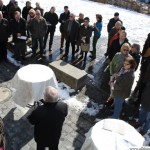
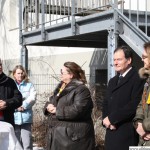
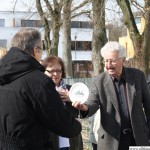



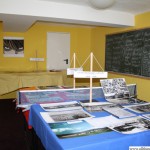
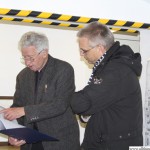


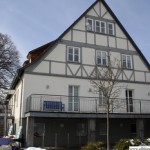
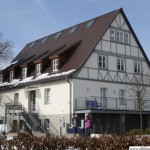






I was stationed at Camp King in June of 1971 through 20 August 1973 in USARGE Detachment A, U.S.Army unit.
Greg, this is Bill Blissett. I don’t know if this will ever reach you almost three years after your 2016 posting, but I’ll try! I arrived at USARGE in the Fall of 1972 after completion of my combat arms detail to the Infantry with the 3rd Inf Div (Mech) at Wildflecken. I was assigned as the Asst S-2/3 Officer at USARGE. Sometime in ’74 (I think) I was reassigned to SPO at HQ TRANSCOM across the street (it was later reflagged as 4th Trans Bde). PCS’d back to CONUS in June ’75 and promoted to captain. I believe ken Robey was your Det. A commander at USARGE during your time there. I’ve got lots of great memories of Camp King (and all the USARGE TDY missions I was on throughout Germany, Greece, Turkey, Crete, and Spain!). Retired from the Army in ’92. Hope you’ve had a great life, Greg! –Bill Blissett, LTC, USA, Ret.
To Greg and Bill,
I was also with you guys at Camp King and have many fond memories. Bill you bought your Ferrari during tat time, which I saw that you sold not to long ago. I tried to track you down but couldn’t find you. I remember the qounset huts at Rhein Main, and the terrible barracks at Camp King. I’d like to hear from you guys. I’m at sroman@lccc,edu.
My father was stationed at Camp King.. 73-77.. Ltc Col George Kuntz… we lived about 100 yards from the Officer’s club.. grew up there.. great memories
My family arrived at Camp King in about April, 1964. We stayed there until June, 1964. I can think of no better place to grow up. I know some of the history of Camp King. Reinhard Gehlen was indeed there at one time.
I loved that beautiful little post, and miss it to this day. My father was a Jaeger, and knew people like Herr Willi Vogt and Otto Buss, among others. In many respects, I’m sorry it’s changed.
Fred Schloss, CK 1960 – 1964
I was stationed at Camp King from the summer of 1979 – the summer of 1980, thereafter voluntarily transferred to Frankfurt.
In September of 1970 I arrived at Camp King as an E2 in the US Army. I was stationed with the Movement Control Agency as a driver for Col. Rodenbeck. I lived up on the hill in one of the houses with the other drivers. I meet my first wife there in 1970 and was married in the chapel in 1972 by Col Spears. Some of my best memories during my 20 years in the Army are of Camp King.